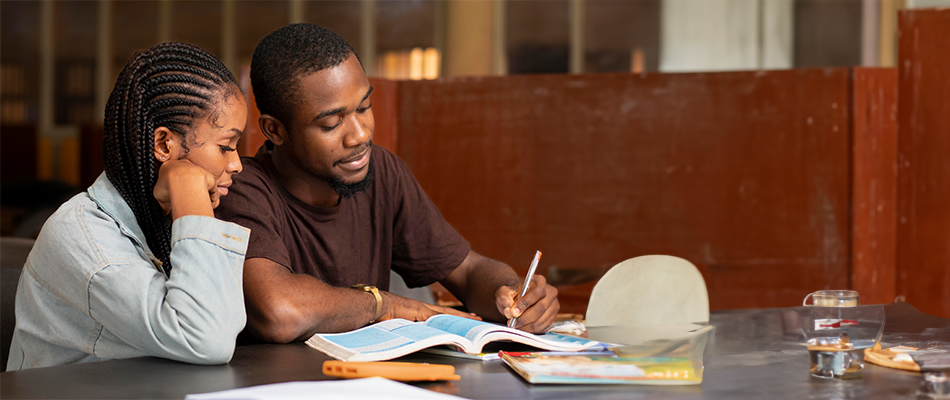You want to make a difference
Right up front, let me make some assumptions about you and why you are reading this.
You are settled in a comfortable career. The COVID Crisis has been difficult, but you still have your job and your family always has food on the table. Every month your savings deductions go through to assure you of a comfortable retirement. And there’s a little bit over.
It’s not much, but you want to do something with it. You want to make a difference. You see the poverty and social disadvantage around you, and you want to add your modest contribution. You want to make the world a better place.
But how do you go about it? Where do you put your hard-earned money so that it will provide the maximum impact? You want your whole investment to go to doing good, you don’t want part of it paying for administration costs. Which social development organisations are credible, with sound governance practices? Not only that, but you also don’t want your money disappearing into a big pot with many other investments; you want to see first-hand how your little bit is making a difference in someone’s life. And, in what sort of initiative should you make your investment? You don’t want to pour your money down a sinkhole. As the old saying goes, you want to help someone to fish, you don’t want to continually be handing out fishes.
If the picture we have sketched above even slightly resembles you, then – congratulations. You are a compassionate human being with sound motives and a dependable set of values.
You are our kind of person.
Making an impact
We see much in the media about impact investing. It’s a welcome trend in the investment environment, and impact investment funds do a great deal of good. When people make investments and expect a return, it mobilises money for causes that might otherwise have not received attention.
Unfortunately, these funds are mainly suited to big investors. Small investors cannot see the specific impact that their small investment is making. There is a need for people to make a difference, and who want to measure their return in social impact rather than by financial returns. If a financial return is not expected, the risk profile changes significantly. The focus is on generating the best social improvement returns.
These sorts of special investors have the specific intention of making an positive social or environmental impact. Further, they require some sort of measurement, other than anecdotal, confirming the impact of their investment.
The sustainability development goals [SDGs] provide a useful criterion framework when considering a potential investment in social improvement. Investment into suitability needs to move into the mainstream. SDG 4 aims to ensure inclusive and equitable quality education and promote lifelong learning opportunities for all.
“Unlike other SDGs, education is not a goal in itself; it is a tool to attain the other goals”
— Janine Händel, CEO, Roger Federer Foundation
At its simplest, the most powerful sustainability investment is done where the venture can continue without additional funding. And, the investment must have all sorts of additional collateral benefits. To put bluntly, there must be multiple non-financial benefit streams.
“If an individual’s investment in education can help reduce mortality, increase peace and security, stem the effects of climate change, lift people out of extreme poverty and foster economic prosperity – all while generating a financial return – we think the attractiveness of the investment case speaks for itself,”
Marisa Drew, CEO Impact Advisory and Finance at Credit Suisse.
Read also: Higher education is a sure way out of poverty
The education gap
What is a sure-fire way of achieving impact? Education by its very nature creates opportunities for those who are the beneficiaries of that education. Targeted educational investment has a role to play in expanding educational opportunities for young adults across the developing world. Supporting access to education can bridge the huge gap between educational supply and demand. Investing in education opens up opportunities that cushions the financial burden borne students and their families.
Investments in education provide powerful opportunities to poor people who lack access to education. Improved human capital encourages employment which in turn drives economic growth, improved productivity, and innovation. Improvements in the education of the poor also support greater social and gender equality. For us in Africa, education increases social mobility and is a powerful mechanism to dramatically improve quality of life.
Countries in the developing world are some of the fastest-growing on earth with young and connected populations. However, the reality is that educational opportunities are not expanding at the same rate and there is a huge unmet educational demand, which if left unaddressed will only deepen social inequities.
“A lot of problems in life are education problems in disguise”
— Tidjane Thiam, CEO, Credit Suisse
Access to higher education
Let’s look at some numbers. The table below is drawn from StatsSA’s General Household Survey (GHS) 2017.
It shows per youth age the percentage of children and youths in various educational facilities and those who are not in any educational facility.
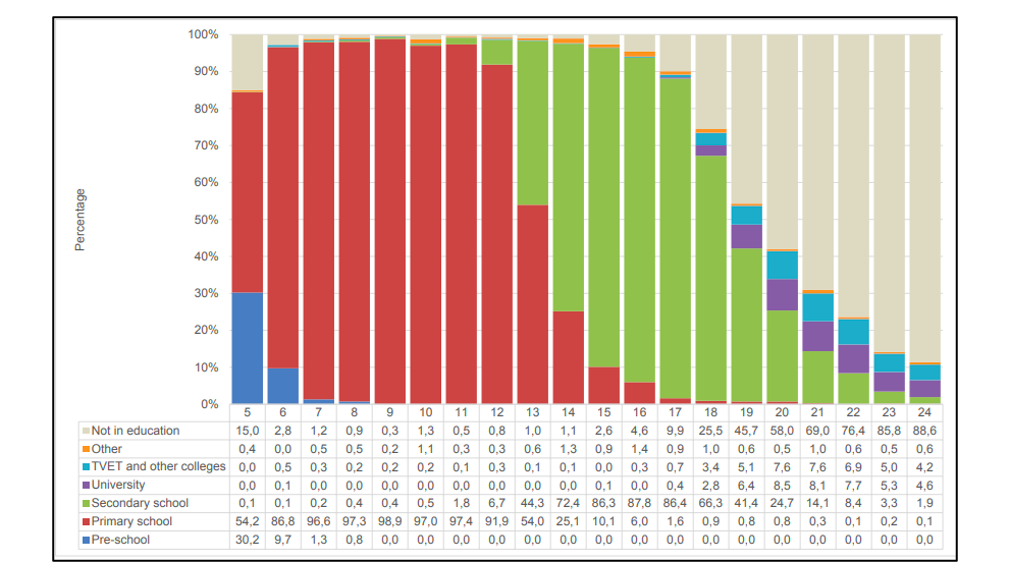
There are many insights to be drawn from the table above. Looking at the column above youths of 19 years of age, 45.7% of them are not in tertiary education – almost half the population of that age. 41,4 percent were still endeavouring to finish school. Yet this is exactly when most young people should be furthering their post-school education to prepare them for a career in the economy. As we go along the age axis towards 24, the situation becomes bleaker and bleaker.
The main conclusion to be drawn is that young people lack opportunity post-school to get into any form of tertiary education.
Where is the funding?
StatsSA has produced data from the General Household Survey (GHS) 2017 on the funding challenges faced by South African students, particularly those wishing to study further at higher education institutions.
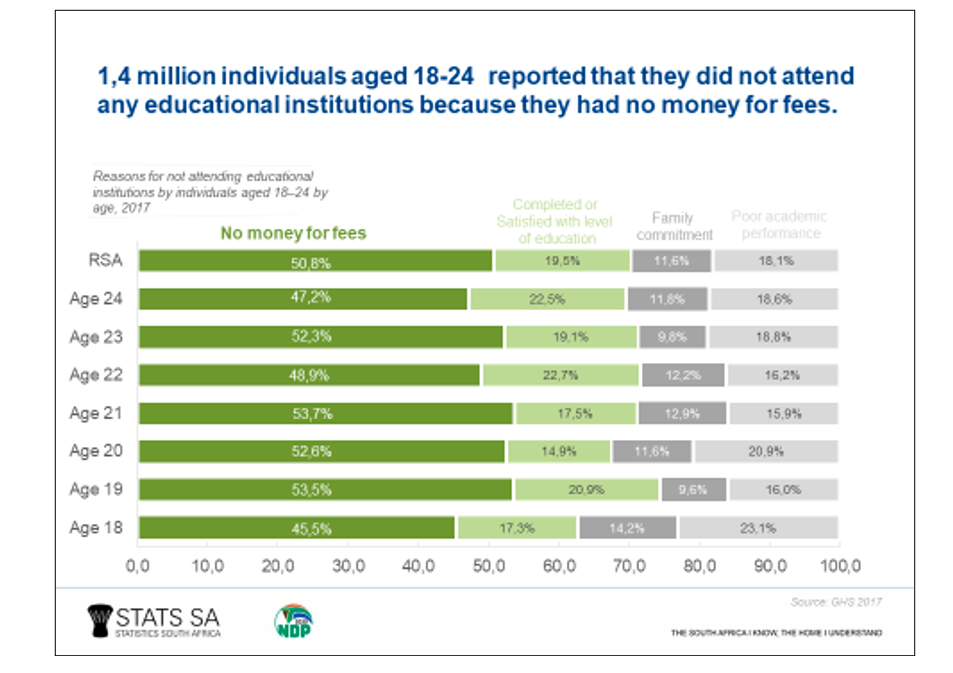
The table above shows that only 33,8% of youth aged 18–24 were attending educational institutions. Among those, 22,2% were attending school while 11,6% were attending post-school educational institutions. More than half (or 51%) of youth aged 18–24 reported that they did not have the financial means to pay for their tuition. Higher education fees funding is a major stumbling block to opening up education for all.
How big is the need for higher education?
The Commission of Inquiry into the provision of free higher education produced a report on 18 March 2019. The report highlights the extent of South Africa’s NEET problem. [NEET is an acronym to describe youths in South Africa who are Not in Employment, Education or Training (NEET)]. It is used to describe young people who have left school and who are unemployed, not studying further and not receiving any form of vocational training In 2014 South Africa had 3 million youths between the age of 18-24 who was classified at NEET. Take a moment to let that sink in, that is 3,000,000 people.
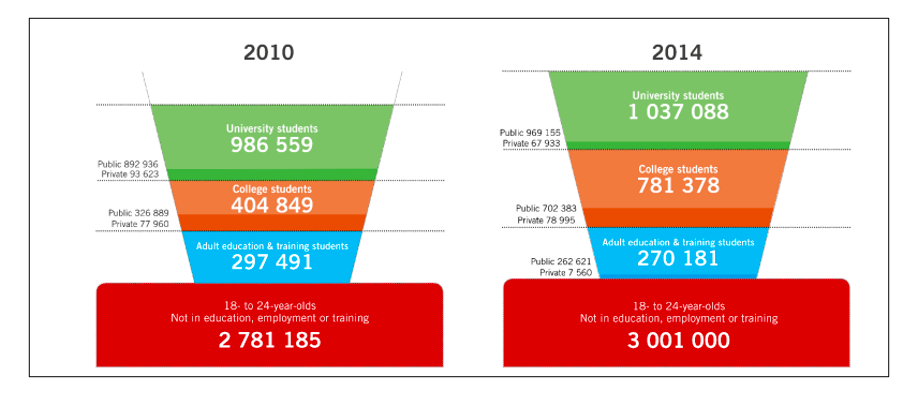
As they put it in the Report:
“The sad reality is South Africa doesn’t have enough education facilities to accommodate all these youths, neither do they or their parents have the money to get them into higher education and training facilities such as Universities or technical schools. Problem this creates is the fact that a large part of these youths will turn to crime, drugs etc to feed themselves and their families, leading to even bigger social problems in South Africa. If you in a University or receiving further education and training and you are between the age of 18-24 be very, very grateful as there are millions less fortunate than you.”
Intergenerational benefits of education
A good education has important intergenerational benefits. Children of well-educated parents will have better life opportunities, and this will pass on in turn to their children. The StatsSA Education Series Volume III: Educational Enrolment and Achievement, 2016 contains the following graph:
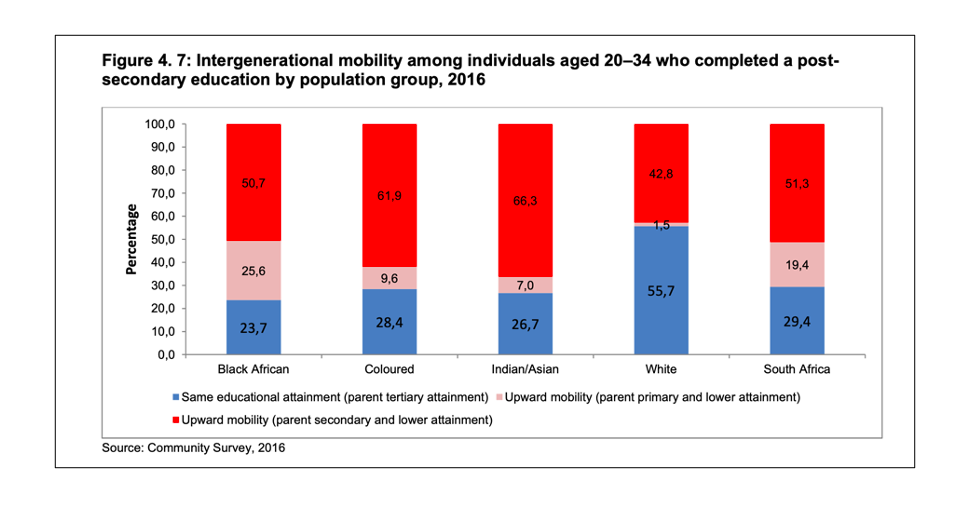
This graph shows that children with better-educated parents would receive on average more schooling than those with parents with the least amount of education. The education system should provide a path for upward mobility for the children of poor families. Many South Africans are still not able to unlock the intergenerational benefit of higher education.
Research indicates that education has a powerful impact on raising incomes, reducing poverty and hunger and creating more resilient societies. One additional year of schooling for an individual increases their earnings by 10% overall and by 20% for women.
The irrefutable argument
By supporting higher education, the payback to poor households is faster. You don’t have to wait for a child to go through the school system before they can make an impact on the economy. When graduates receive their qualifications, they are much better placed to secure good jobs with good salaries. The extra income in households leads to more spending, which creates more income, and so on. Households have more money to spend on food, education and health care and the next generation is set up for success. This is a virtuous process. And once you have made the investment in a person, you do not have to continually make payments. A person with an education has it for life. They are – as the saying goes – able to fish for themselves.
Official statistics suggest that business management is one of the most popular courses among university students worldwide. The reason for its popularity is that the knowledge and skill gained in a business qualification allow successful graduates to work across the board – from old age homes to steel smelters, from breweries to banks and family grocery stores to multinational corporations. There is hardly an endeavour that does not require business skills in some form or other. It is a wonderful way to future proof an investment.
The Regenesys Ed4All Programme
You have got this far – and you still want to make a difference! You want to make the world a better place! We applaud you!
So, let’s remind ourselves, the best way of securing broad social and economic upliftment is to help disadvantaged youngsters to get a good tertiary education.
Regenesys Business School believes that education is the greatest equaliser in addressing the social and economic disparity in South Africa and the African continent. The Business School serves society by uplifting people out of poverty and empowering them to live successful lives with purpose through Education, in line with your own aspirations and commitment.
Through the Regenesys Foundation, they have created a unique education for all [ED4ALL] programme to disrupt traditional models of education. It uses technology to deliver online life-changing programmes from as little as R500 per month. Students pay back their study fees once they begin earning. The initiative is open to those who truly are poor, who lack the funds, but who have the aptitude and desire to study further. All of every investment goes to education, nothing goes to administration. The content is exactly the same as that which full-paying students receive.
This is exactly the opportunity you have been looking for.
The Ed4All programme creates the opportunity for you or your organisation to sponsor a candidate as they launch their online university career. It makes it so much easier.
Regenesys will fit in with your requirements. You may wish to make a regular donation and they will allocate it to a worthy recipient. You may want to sponsor a family member or the child of a work colleague. Your company may make it available as a general CSI programme to the children of employees. There are so many ways to make a difference.
High youth unemployment rates remain one of the greatest challenges to economic transformation in South Africa. For as little as R500 per month, you could provide a young South African with an opportunity to attain the skills and qualifications needed to gain entry to the jobs market, transforming not only their lives but the lives of their family and the greater community.
Your support will enable your special beneficiary to secure a better future, thereby accelerating economic transformation in vulnerable communities one person at a time. Here you have a programme where you will be able to see, first-hand, the impact your investment is making. You have the power to change lives.
Click here to make that important first step.
Do it now.




